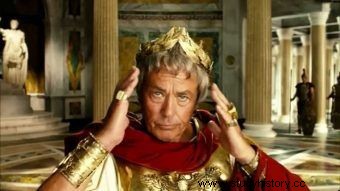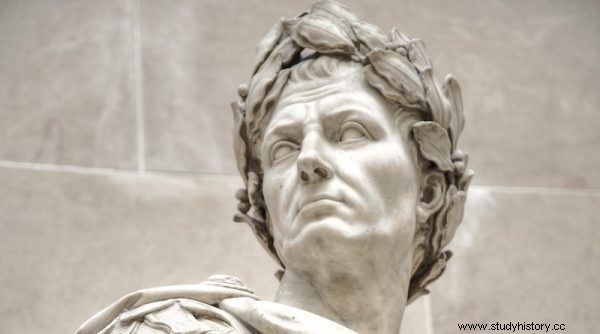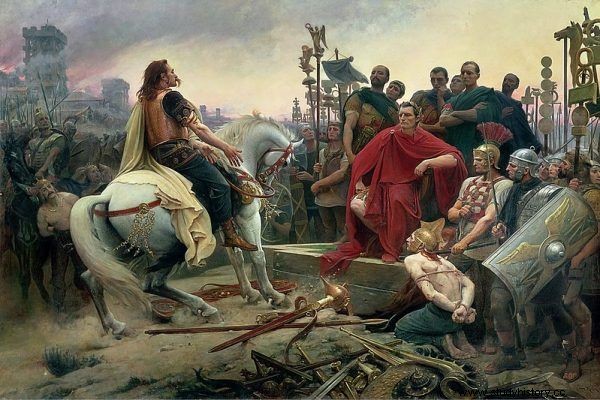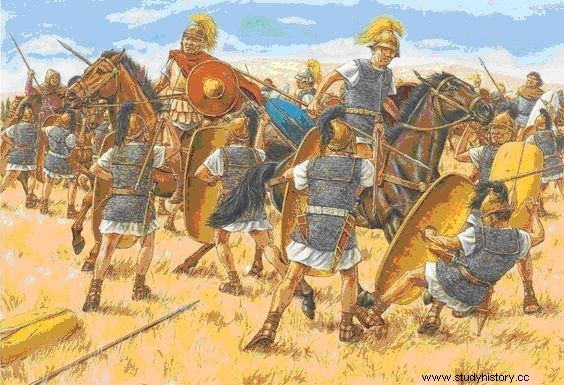Julius Caesar won 48 out of 50 battles fought, one of the highest scores attributed to historical commanders. How did he do it?
About Gaius Julius Caesar, it can certainly be said that he was ambitious. Perhaps even a bit too much. At thirty-one years old, as described by Plutarch, he was to say:
Don't you think I have reason to cry if Alexander, at my age, already ruled over so many peoples and I had not yet done a single famous deed?

What made Julius Caesar successful?
Wanting to equal the statuesque figure of Alexander the Great, as a politician and strategist, he accomplished many important deeds, writing himself down on the pages of history in really big letters. However, the question arises - was Caesar actually a strategic genius, or was he just a lot of money, lucky and an advantage over his opponents? Let's take a closer look at his actions on the battlefield…
A natural leader
The war adventure of the Roman ruler began with the campaign in Asia Minor, where, as a beginning politician, he helped Marc Minucius Termus in the siege of Mytilene on the island of Lesbos. He took an active part in the fight, in recognition of his merits he was awarded the corona civica medal . It was received by soldiers who saved the lives of Roman citizens in battle and it was associated with a very high prestige.
In 74 BC he set out to defend Bithynia against the ruler of Pontus Mithridates VI Eupator. This was the first time he showed his leadership skills . There he found scattered and disorganized Roman forces, which he managed to gather and resist the invaders. It is worth mentioning at this point the way in which the leader managed the soldiers. Unlike most rulers, Caesar tended to reduce the social distance between himself and the armed , addressing them per hetairos, or "companions" - just as Alexander the Great spoke to his people.

Julius Caesar - bust from the Farnese collection, in the Museo Archeologico Nazionale in Naples
He did not exalt himself, instead constantly being among the soldiers, sleeping with them in the field conditions, and even starving during sieges . He tried to maintain high morale and constantly raise the spirit of the army. After the victorious fights, he did not regret taking part in the spoils. Definitely, Roman soldiers must have worshiped such a leader!
Conquests
Caesar's subsequent conquests began in 61 BCE, when he took over Spain as governor. Despite some difficulties, he was victorious and was once again glorified. His successes in the military and political fields allowed him to make bolder and bolder moves. He concluded a triumvirate with Gnaeus Pompey and Mark Licinius Crassus. It soon became clear that he and his allies reigned supreme, introducing further reforms without resistance. He was granted the governorship of Pre-Alpine Gaul, Illyria and Narbonne Gaul. The stage of conquests began, during which Caesar crushed the mighty tribe of the Helvetians, and then the Swebs, Euds, Germans, Belgians and Nervii.
The forces of the opponents were much more numerous. At first, the Roman commander had only single legions. However, in the Battle of Bibrakte, he won thanks to quick decisions and clever maneuvers, with only 30,000 legionnaires fighting against some 380,000 Helvetians and their allies. Estimates say that up to two-thirds of the total Gaulish tribe died on the battlefield then! In a situation where the threat cast a shadow over the life of Caesar and his people, he did not hesitate to share the fate of a soldier:
The enormous mass of warriors easily repelled the Roman cavalry. Now they were walking in close formation straight into the legions. The front row held a shield against the shield, making it seem like a wall without the slightest pause, sweeping everything away in front of it. Even the bravest legionnaires began to catch fear by the throat. At that moment Caesar dismounted and ordered him to be led away. All officers followed his example. It was a simple sign for the soldiers, but telling and comforting:the danger is the same for everyone, in the event of a defeat, no one will be saved by escaping, the commander and officers will share the fate of their legions.
- writes Aleksander Krawczuk in the biography of Julius Caesar.

Julius Caesar was adored by his soldiers
Soon Caesar's forces wandered to the borders of Northern Gaul, where they clashed with the army of King Ariovista. During the final battle in 58 BCE, preceded by long stalks, Julius showed remarkable patience and the ability to assess risk. The Suebi had cut off all supply routes for the Romans, and Ariovisti was aware of his position advantage. So he harassed the legionaries, trying to overcome them with fatigue. He sent horse rides that hit wherever the opportunity arose. Caesar did not react, and the stalemate lasted for days.
Finally the Romans began to withdraw, which was a classic when Julius did:he wanted to move the battle to a place more convenient for him . During the fighting, several Gauls were captured, who testified that Ariovist planned to enter the battle only "with the new moon", which was out of the question for Caesar - he would have to wait too long. The next day, the Romans went out into the field, arranging all six legions in a triple formation, and then going directly to the German camp. Caesar noticed that the left wing of the opponents was weaker in numbers, so he ordered - again like Alexander the Great - to strengthen his right flank, which created a "oblique" formation. The numerical superiority of the Romans on the right flank, of course, led to dominance on this side of the battlefield, and then repulsion of the Germanic warriors. Once again, Caesar's armies proved more effective in combat thanks to their iron discipline and the leader's swift decisions.
In 56 BC the famous commander also had the opportunity to prove himself in naval battles, destroying the invincible Venetian fleet with the help of smaller, more agile galleys built for this purpose at the mouth of the Loire.
The first real defeat in his career was Caesar in the Battle of Gergovia, which he fought against Vercingetorix's army. The insurgents, led by a talented leader of Gallic origin, defended themselves in an excellent position, taking advantage of the difficult terrain. Caesar decided, according to art, to dig around Gregory, cut off the Gauls from supplies. Meanwhile, Vercingetorix was strengthening the stronghold from the west, from where he expected an attack. The Roman commander soon noticed that from the south the Gallic forces were the least numerous, so he ordered a subversive action (simulating the movements of troops in the west) and launched a silent attack. Everything was going according to plan, but this time discipline failed:the legionaries, having defeated the few defenders, broke down and began to storm the walls of Gregow . Most did not hear the signal to retreat in the clamor of the battle, and then the forces of the Gauls came.

Julius Caesar is considered one of the best leaders in history
The stretched and weakened ranks of the Romans began to yield under the pressure. The nail in the coffin turned out to be ... the arrival of reinforcements of the Euden allies with the Romans, who were initially taken for further opponents . The legionaries panicked and the battle ended with the loss of 46 centurions and approximately seven hundred Roman soldiers.
Caesar later blamed the lack of discipline on his soldiers. As we read in his diary from the Gallic Wars, he accused them of:
they arbitrarily decided where to go forward or what to proceed, and neither stopped when signaled to stop, nor could the military tribunes stop them.
He drew their attention to the importance of the inequality of positions, as he himself had learned at Avaricum, when, after surprising the enemies who were without a commander-in-chief and without cavalry, he gave up a certain victory, so as not to risk even slight losses during the fight due to the inequality of positions. And while he is full of admiration for their heroism, which neither the fortifications of the camps, nor the height of the hill, nor the height of the city wall could restrain, must rebuke their arbitrariness and disobedience, because they thought they understood each other better than the commander-in-chief. victory, as well as on the fate of combat operations - "soldiers are required to be obedient and self-controlled to no lesser extent than bravery and heroism".
Vercingetorix was later defeated by Julius in a siege with only 50,000 men against a three times greater Gallic force.
Civil war
During the Gallic Wars, Caesar won despite the fact that he was outnumbered by the iron discipline of his troops. The battle techniques of the Romans were much more advanced than those used by primitive tribes, so it can be said that he had a great technological and civilization advantage. But Caesar wasn't just fighting the "barbarians" .
In 48 BCE, during the Civil War, his few troops had to fight against Pompey's soldiers. About 30,000 soldiers fought on Caesar's side (with the support of Mark Antony's legions), while Pompey had about 45,000. The situation became desperate for Juliusz, there was no food and supplies were cut off . Forced into battle, Caesar ordered an attack, but his soldiers became completely depressed and began to flee. Everything could have ended tragically if not for the emperor's fame as a great strategist:Pompey assumed that the panic in the ranks of the enemy might be simulated and ordered the pursuit to be stopped. Caesar lost about a thousand soldiers then, withdrew and a month later defeated Pompey's forces at Pharsalus.

Caesar defeated Pompey at the Battle of Pharsalus
Caesar's success was sealed with the final victory over Pompey, after which he assumed independent power over Rome. If it had not been for the ability to make quick decisions, as well as self-control and good name among soldiers, it certainly would not have happened! He mastered the use of Roman strategy and technology to perfection, which he showed during the civil war, defeating Pompey. So the answer to the question posed at the beginning is:it is definitely not just a backstop issue. Caesar was playing a risky and difficult game in which only a brilliant leader could win.
